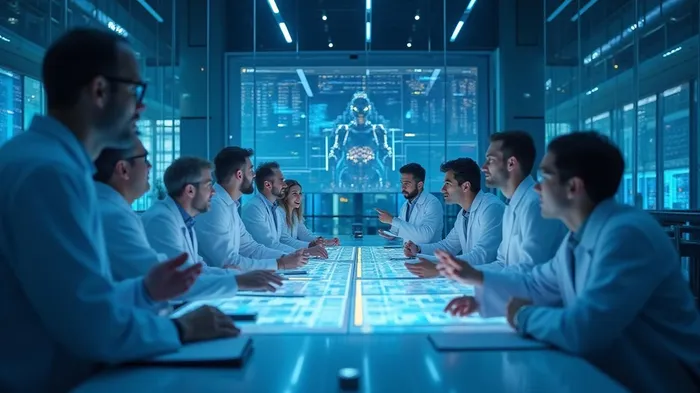OpenAI-Microsoft Partnership Strained by Resource Disputes, AI Advancements
In recent developments, the once harmonious relationship between OpenAI and MicrosoftMSFT-- appears to be fraying at the edges. Sam Altman, CEO of OpenAI, had previously described the partnership as "the best in the tech industry." However, recent events suggest that this allianceAENT-- may be facing significant challenges.
Over the past six years, Microsoft has invested tens of billions of dollars into OpenAI, fueling its rapid growth and the success of its flagship product, ChatGPT, which has garnered over 500 million users weekly. In return, OpenAI has provided Microsoft with advanced generative AI tools, contributing to the tech giant's stock price tripling. However, the partnership is now showing signs of strain.
Sources close to the matter reveal that disagreements have arisen between the CEOs of both companies regarding Microsoft's provision of computational resources to OpenAI, Microsoft's access to OpenAI's models, and the potential for OpenAI's AI systems to achieve human-like intelligence under Altman's leadership. Microsoft CEO Satya Nadella has prioritized the sales and usage of Copilot, a competitor to ChatGPT, and has quietly hired one of Altman's rivals to develop Microsoft's own large models, aiming to reduce dependence on OpenAI.
Despite these tensions, both companies remain influential in the current global AI race. Microsoft has the capability to hinder OpenAI's transition into an independent, profitable company. If this transition does not occur by the end of the year, OpenAI could face losses in the hundreds of billions of dollars. However, as of now, Microsoft has not threatened to take such action. Conversely, OpenAI's board has the authority to invoke a contractual clause that would restrict Microsoft's access to its most advanced technologies. This clause has been discussed internally within OpenAI over the past year.
The collaboration between Altman and Nadella began in the summer of 2018 during a brief encounter at the Allen & Co. annual investment conference in Sun Valley, Idaho. At the time, Altman had recently co-founded OpenAI with the goal of developing Artificial General Intelligence (AGI) that surpasses human capabilities. During their five-minute conversation, Altman mentioned OpenAI's plans for large-scale funding, leading to an agreement to stay in touch.
A year later, Microsoft invested $1 billion in OpenAI, gaining exclusive access to its technology and becoming its sole cloud service provider. Although the initial collaboration did not garner much attention, the launch of ChatGPT in November 2022 ignited global interest in generative AI, forcing competitors like Google and Meta to rethink their strategies. This propelled Microsoft to the forefront of the new AI race, even briefly topping the global market capitalization rankings.
During the peak of their relationship, Nadella frequently sent multiple messages to Altman, who promptly responded. When internal communications hit roadblocks, Altman would post screenshots of his exchanges with Nadella on OpenAI's Slack group to resolve the issues. In early 2023, Microsoft injected another $100 billion into OpenAI to support the training of new models using Microsoft's data centers. However, the same year saw the sudden ousting of Altman from OpenAI's board, causing a stir. Nadella swiftly expressed his support for Altman, but the incident served as a wake-up call for Microsoft, highlighting the need to prepare for the potential loss of Altman or OpenAI itself.
Unbeknownst to Altman, Nadella began reaching out to Demis Hassabis, co-founder of Google DeepMind, and eventually acquired him along with the Inflection AI team for $650 million. Hassabis was tasked with developing a large language model capable of challenging GPT-4, but initial progress was slow, forcing Microsoft to continue relying on OpenAI's technology.
Tensions escalated during a meeting about knowledge property sharing, where Hassabis publicly criticized OpenAI's legal team, causing high-level anxiety. The core of the conflict lies in OpenAI's advancement towards human-like intelligence models. According to the agreement with Microsoft, if OpenAI successfully develops such a model, its board has the right to reassess the partnership. Altman is confident in this possibility, but Microsoft representatives have opposed it, stating that current technology is far from meeting this standard. Nadella even described it as a "ridiculous standards game" in a podcast.
OpenAI was taken aback by Microsoft's stance. Meanwhile, OpenAI seeks more computational power and top-tier chip resources from Microsoft, which has responded by stating that it has already provided the maximum support possible and has relaxed some exclusivity clauses. The strained relationship worsened last summer when OpenAI developed a new model codenamed "Strawberry," leading to delays in technical delivery that frustrated Microsoft. OpenAI's team is reportedly still exploring the model's capabilities, requiring more time for refinement.
The once-frequent text exchanges between the two leaders have now dwindled to weekly routine calls. Sources indicate that a large-scale data center project between Microsoft and OpenAI has been put on hold following Altman's ousting. In January, Altman appeared at the White House podium alongside Trump, Masayoshi Son, and Larry Ellison to announce a $500 billion investment plan called "Stargate," led by a Japanese consortium and Oracle. This project was part of Altman's vision for future AI development, which he had hoped to pursue with Nadella.
At that time, Nadella was in Davos, missing this pivotal announcement that symbolizes the future landscape of AI. The evolving dynamics between OpenAI and Microsoft underscore the complexities and challenges inherent in high-stakes technological partnerships, as both companies navigate the rapidly changing AI landscape.

Stay ahead with real-time Wall Street scoops.
Latest Articles
Stay ahead of the market.
Get curated U.S. market news, insights and key dates delivered to your inbox.

Comments
No comments yet